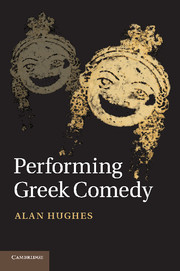Book contents
- Frontmatter
- Contents
- Illustrations
- Preface
- Chapter 1 Comedy in art, Athens and abroad
- Chapter 2 Poets of Old and Middle Comedy
- Chapter 3 Theatres
- Chapter 4 The comic chorus
- Chapter 5 Music in comedy
- Chapter 6 Acting, from lyric to dual consciousness
- Chapter 7 Technique and style of acting comedy
- Chapter 8 The masks of comedy
- Chapter 9 Costumes of Old and Middle Comedy
- Chapter 10 Comedy and women
- Chapter 11 New Comedy
- Catalogue of objects discussed
- Notes
- Glossary
- Bibliography
- Index
Chapter 6 - Acting, from lyric to dual consciousness
Published online by Cambridge University Press: 05 February 2012
- Frontmatter
- Contents
- Illustrations
- Preface
- Chapter 1 Comedy in art, Athens and abroad
- Chapter 2 Poets of Old and Middle Comedy
- Chapter 3 Theatres
- Chapter 4 The comic chorus
- Chapter 5 Music in comedy
- Chapter 6 Acting, from lyric to dual consciousness
- Chapter 7 Technique and style of acting comedy
- Chapter 8 The masks of comedy
- Chapter 9 Costumes of Old and Middle Comedy
- Chapter 10 Comedy and women
- Chapter 11 New Comedy
- Catalogue of objects discussed
- Notes
- Glossary
- Bibliography
- Index
Summary
The dominant choric poetry of the sixth century was lyric: hymns, dithyrambs, or songs of praise for a patron or an athletic victor. The earliest poets are too legendary for strict credibility. Herodotus’ claim that Arion invented dithyramb is not strengthened by his anecdote of the poet's rescue from pirates by a friendly dolphin, contradictory tales about Alkman are almost as numerous as his surviving fragments and Stesichoros was allegedly buried in several places. Lyric poets of the later sixth and early fifth centuries, however, are more reliably documented, and significant portions of their works have survived. Composing songs for the ruling classes in much of the Greek world, Simonides, Pindar and Bacchylides were itinerants. An aristocratic native of Boiotia, Pindar enjoyed a celebrity that took him to Macedonia, Asia Minor, Cyrene and Sicily: like Aischylos, Pindar and Simonides both sojourned at the court of Hieron of Syrakousai (478–467/6). The poets taught their lyrics to choruses of young men and personally led their public performances. In a fragment, Archilochos boasts that he knows how to lead the ‘beautiful dithyramb of the lord Dionysos’ while appropriately drunk with wine. He refers to the poet as exarchos, where he improvised verses, and they answered with a refrain.
While other lyric forms declined along with noble patronage, dithyramb was co-opted by the Athenian democracy. The city emerged as a rewarding market for poets, developing its Great Dionysia and the choregia as expressions of the polis. Competition between dithyrambic choruses of men and boys was pursued as enthusiastically as were athletics, because everyone was eligible to compete. Tragedy and comedy were fresh choral forms, which arose in the Attic countryside; composed by citizen amateurs, and performed by well-drilled citizens, the new choral forms shook off their rustic origins and took their place beside dithyramb as public dance-poetry. Performed in the competitive context of the Dionysia, comedy evolved rapidly, transforming itself into dramatic art. As poets strove to devise innovations that might bring victory, they turned to actors for their potential as the instruments of narrative, dramatic conflict and its resolution.
- Type
- Chapter
- Information
- Performing Greek Comedy , pp. 106 - 145Publisher: Cambridge University PressPrint publication year: 2011



